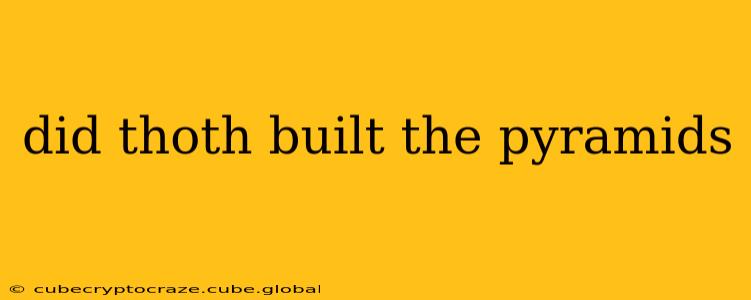The question of whether Thoth, the ancient Egyptian god of wisdom, writing, and magic, built the pyramids is a fascinating blend of mythology and historical fact. The short answer is no, there's no credible historical evidence to support the claim that Thoth, a deity, personally constructed the pyramids. However, the question itself reveals a deeper interest in the mysteries surrounding these magnificent structures and the rich tapestry of ancient Egyptian beliefs. Let's delve into the specifics.
Who Actually Built the Pyramids?
The pyramids, particularly the Great Pyramid of Giza, were built by skilled laborers, artisans, and engineers working under the direction of the pharaohs of the Old Kingdom. These were not slaves, as commonly depicted, but rather highly organized teams of skilled workers who were well-fed, housed, and compensated for their labor. Archaeological evidence, including worker settlements and inscriptions, supports this understanding. The construction process involved sophisticated engineering techniques, including the quarrying of massive stones, their transport over long distances, and their precise placement using ramps, levers, and other ingenious methods.
Why the Myth of Thoth's Involvement Persists?
The persistent association of Thoth with the pyramids likely stems from several factors:
-
Thoth's association with knowledge and magic: As the god of wisdom, Thoth was often seen as a figure capable of extraordinary feats. This perception naturally lends itself to myths and legends attributing supernatural abilities to him, including the construction of impossibly grand structures.
-
The mysterious nature of pyramid construction: The sheer scale and precision of pyramid construction have always captivated the imagination, leading to speculation and fanciful explanations. The lack of complete understanding of certain aspects of the building process further fuels the myths.
-
The blending of mythology and history: Ancient Egyptian texts often intertwine mythical narratives with historical events, blurring the lines between fact and fiction. This blending can make it difficult to separate factual accounts from mythical interpretations.
What Other Gods Are Associated with Pyramid Construction?
While Thoth isn't directly linked to pyramid construction in reliable historical sources, other deities played symbolic roles in the funerary rituals and beliefs surrounding the pyramids. These included:
-
Ra: The sun god, Ra, was often associated with the pharaoh's power and the sun's journey across the sky, mirroring the pharaoh's journey to the afterlife.
-
Osiris: The god of the underworld, Osiris, was intimately connected to the pharaoh's transition to the afterlife, and the pyramids themselves served as symbolic gateways to the realm of the dead.
These associations are symbolic, reflecting the religious beliefs and cosmological worldview of ancient Egyptians, not literal involvement in the construction process.
How Were the Pyramids Actually Built?
The construction of the pyramids involved a complex interplay of planning, organization, and engineering. While the exact methods used remain a subject of ongoing research and debate, evidence suggests the following:
-
Quarrying: Large blocks of limestone were quarried from nearby sites.
-
Transportation: These blocks were transported to the building site using various methods, potentially including sledges, rollers, and possibly water transport.
-
Lifting and Placement: Ramps, levers, and possibly other lifting devices were used to raise the massive stones into position.
-
Precision: The astonishing accuracy of the pyramid's construction reflects a high level of engineering skill and planning.
Are there any alternative theories about pyramid construction?
Several fringe theories exist, proposing alternative explanations for pyramid construction that often involve advanced technology or supernatural intervention. These theories lack credible evidence and are generally rejected by mainstream Egyptologists. The overwhelming consensus among experts points to the skilled labor and engineering capabilities of ancient Egyptians as the explanation for the construction of the pyramids.
In conclusion, while the myth of Thoth building the pyramids persists, it lacks historical foundation. The pyramids were the product of human ingenuity, meticulous planning, and immense effort by skilled ancient Egyptian workers, not the work of a god. The enduring fascination with the pyramids, however, continues to spark interest in both their engineering marvels and the rich cultural and religious context of ancient Egypt.
